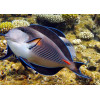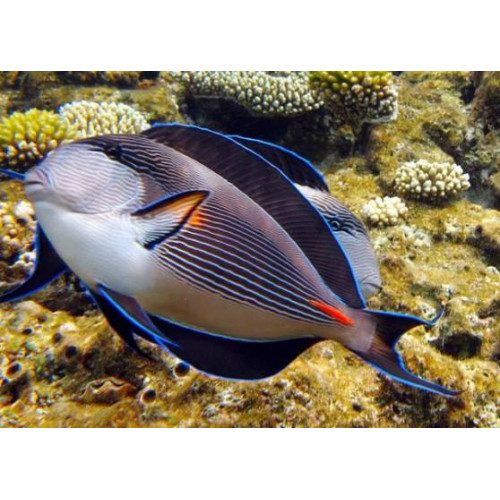Species Name : Acanthurus Sohal
Care Level : Moderate
Temperament : Semi-aggressive
Color : Black, Blue, Green, Yellow
Diet : Herbivore
Reef Compatible : Yes
Water Conditions : sg 1.020-1.025, 72-78° F, dKH 8-12, pH 8.1-8.4
Max. Size : 1' 4"
Origin : Red Sea to the Persian Gulf
Family : Acanthuridae
Minimum Tank Size : 250 gallons
Sohal Tang (Acanthurus Sohal) or Sohal Surgeonfish - endemic to the Red Sea and Persian Gulf. The Sohal Tang is a hardy and generally reef safe fish that can be challenging due to its potential size and aggressive nature.
Like other tangs, the Sohal Tang is compressed laterally, making it extremely maneuverable and fast along the reef. The easiest way to identify a Sohal Tang is by its vermiculated stripes. The Sohal's alluring beauty of contrasting and sometimes vermiculated stripes alternate from light to dark with most of its fins being jet black with electric blue outlining them. There is also a patch of orange post gill plate and on the peduncle where the Sohal's sharp, boney "scalpel" lies. During defense and aggression, tangs flick the spine at other fish or intruders, causing physical harm.
The first condition of maintenance is of course the size of the aquarium, which must be at least 250 gallons at the strict minimum to properly accommodate this imposing sportsman. A reef aquarium will be ideal for this Surgeon: the water is clean and well oxygenated, the current is strong and the intense lighting allows the growth of the algae he feeds on.To reassure this nervous fish, plan many hiding places, holes and interstices when you install your rocks.
Sohal Tangs can be very aggressive and should not be kept with other Tangs. They tend to be well-behaved with old tank mates but can be very aggressive to any new additions. They are only suited for large aquariums with other fish capable of handling their aggressive and domineering behavior. Usually considered reef safe.
When in the aquarium, they will spend most of their time swimming around and nibbling the algae from the stones. Hungry Sohal Tangs start eyeing large polyp stony (LPS) corals. It isn’t a behavioral issue, though; it’s a cry for help. If you see your sohal nibbling the polyps, it means they’re hungry. You need to examine your feeding regime – and fast.
Its primary diet consists mostly of vegetable matter, but occasionally includes the flesh of other animals. Don’t slide to an all-veggie diet, either. Distribute at least 2 to 3 large meals a day to satisfy the appetite of this energetic giant.
Size:
Small/Medium: 2" to 2-3/4»
Medium: 2-3/4" to 3-1/2»
Medium/Large: 3-1/2" - 4"
Large: 4" to 5"
-
There are no reviews for this product.
-
No questions yet
Tags: Fishes


